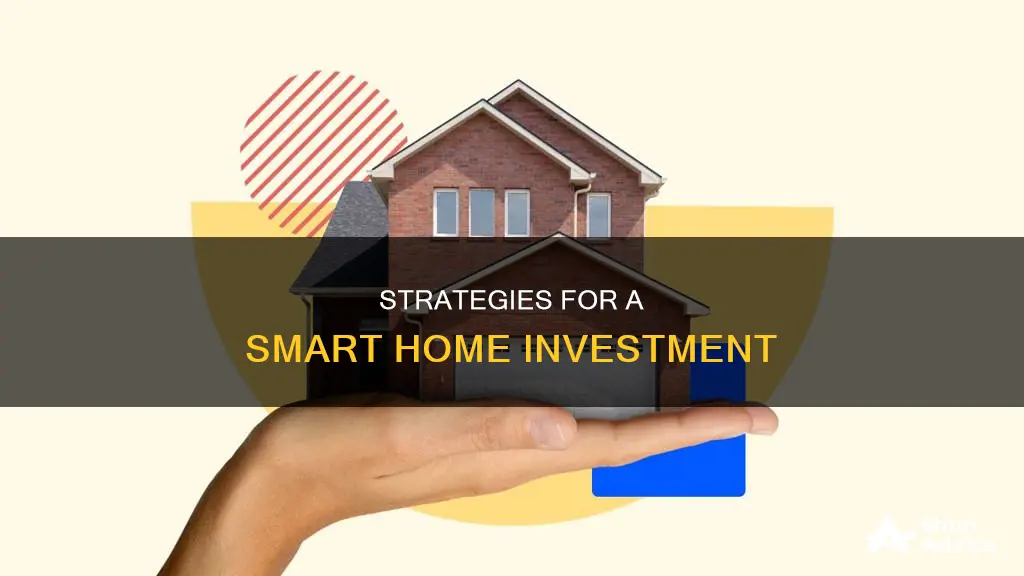
Owning a home is often seen as a key milestone on the pathway to success. However, the high costs of acquisition and maintenance make it a risky investment. While it can be a good investment in the long run, it is not a traditional investment as it is the place where you live. It is also illiquid and can be expensive to buy and sell. Moreover, it is subject to the fortunes of the local economy and can be heavily taxed.
| Characteristics | Values |
|---|---|
| Appreciation | The value of your home typically rises over time. |
| Equity building | You build equity when you make mortgage payments and/or your home's value increases. |
| Tax benefits | You can deduct mortgage interest and property tax payments on your taxes every year. |
| Financial stability | Homeowners have an average net worth of $300,000, which is 37 1/2 times the net worth of renters at $8,000. |
| Lifestyle benefits | Homeowners typically have more square footage than renters. |
What You'll Learn
- Location, location, location: The value of your home depends on where it is
- Buy in a buyer's market: You're more likely to get a good deal on a home purchase when there are more sellers than buyers
- Consider the costs: Factor in closing costs, maintenance, and property taxes when deciding whether to buy a home
- Compare to renting: Depending on the market, renting may be a more sensible option than buying
- Think long-term: Plan to be in a home for at least three to five years to recoup closing costs and build equity

Location, location, location: The value of your home depends on where it is
When you invest in a home, you are not just buying the structure you plan to live in – you are also investing in the plot of land beneath it. While you could alter the size or condition of your house, you can't change the location of where it stands. It's important to keep this in mind when purchasing a home.
After all, your location is a major factor in how much your home appreciates. For example, from November 2022 to November 2023, home prices increased by about 9.8% on average in the New England region of the US, while homes in the West South Central region only increased by about 3.1%.
When choosing a location to buy your home, you should also consider its proximity to local communities, the size of your plot of land, and the level of development of the city you're located in. These factors will all play a role in the value of your home and how it appreciates.
- The quality of the local schools: If you have children or plan to in the future, the quality of the local schools will be an important factor in your home-buying decision. Even if you don't have kids, the quality of the local schools can still impact the value of your home.
- The crime rate in the area: A high crime rate can negatively affect the value of your home and may make it more difficult to sell in the future.
- The availability of amenities: Consider the proximity of your potential home to amenities such as shops, restaurants, parks, and public transportation. These amenities can add to the value of your home and make it more attractive to potential buyers.
- The zoning regulations in the area: Be sure to research the zoning regulations in the area before purchasing a home. You don't want to buy a home only to find out later that the area is zoned for commercial use, which could negatively impact the value of your home.
- The future development plans for the area: Research any future development plans for the area, such as new roads, schools, or businesses. These developments could positively or negatively impact the value of your home.
IBM's IT Investment Strategies: Secrets to Their Success
You may want to see also

Buy in a buyer's market: You're more likely to get a good deal on a home purchase when there are more sellers than buyers
When it comes to making a home purchase, timing is everything. Buying a home in a buyer's market, when there are more sellers than buyers, can help you get a better deal. However, timing the market and selling your home to maximise your profit can be tricky. It involves purchasing your home in a buyer's market and selling it in a seller's market, where the number of buyers exceeds the number of sellers.
In a buyer's market, you have the upper hand as a buyer. You have more options to choose from, and sellers are more likely to be flexible on price and other terms. This is because they are competing with other sellers to attract a limited number of buyers. As a result, you are in a stronger negotiating position and have a better chance of getting a good deal on the home you want to purchase.
On the other hand, in a seller's market, there are more buyers than sellers, which gives sellers the advantage. They can often command higher prices for their homes and may even be able to initiate a bidding war to drive up the price. However, it is challenging to get both scenarios just right, and many people end up selling too soon or waiting too long, failing to maximise their profit.
Therefore, if you are looking to buy a home, it is essential to carefully consider the current market conditions and your financial situation. Buying a home can be a good investment, but it is not always the right move for everyone. It is crucial to weigh the pros and cons of homeownership and make a decision that aligns with your unique circumstances and goals.
Building a Balanced Investment Portfolio: Strategies for Success
You may want to see also

Consider the costs: Factor in closing costs, maintenance, and property taxes when deciding whether to buy a home
When deciding whether to buy a home, it is important to consider the costs involved. These costs include closing costs, maintenance, and property taxes.
Closing costs are usually 3% to 6% of the loan amount. For example, if you are buying a $250,000 home, closing costs could range from $7,500 to $15,000.
Maintenance costs for a home can be expensive and are ongoing. On average, you can expect to pay 1% to 4% of your home's total value on routine maintenance each year. This includes costs for mowing the lawn, clearing gutters, servicing appliances, and pest control.
Property taxes are another cost to consider when buying a home. These taxes are typically paid annually and can increase over time.
It is important to factor in these costs when deciding whether to buy a home. While buying a home can be a good investment, it is crucial to be aware of the associated costs and budget accordingly.
Gabon Investment Guide: India's Gateway to Central Africa
You may want to see also

Compare to renting: Depending on the market, renting may be a more sensible option than buying
When deciding whether to buy or rent a home, it's important to consider the market. Depending on the market, renting may be a more sensible option than buying. Here are some reasons why renting may be the better choice:
- Lower costs: In some cities, renting may be the more affordable option. High home values and steep mortgage rates can make renting a more cost-effective choice.
- Flexibility: Renting offers the flexibility to relocate easily when your lease ends. Selling a home is typically a more complex and time-consuming process.
- Less financial burden: Renting can free up cash flow that would otherwise be tied up in a mortgage and other homeownership costs, such as property taxes, maintenance, and insurance. This can provide more financial flexibility and liquidity.
- No long-term commitment: Renting allows you to try out different neighbourhoods and living situations without the long-term commitment of buying.
- Simpler budgeting: With a fixed-rate rent, you know exactly how much you'll be paying each month, making it easier to budget. In contrast, homeownership costs can fluctuate, and unexpected repairs or maintenance expenses can strain your finances.
- No down payment: Renting typically doesn't require a large down payment upfront, unlike buying a home, which demands a substantial down payment and closing costs.
- Less responsibility for maintenance: As a renter, you're generally not responsible for maintenance and repairs, which can be costly and time-consuming.
Maximizing Investment Returns: Strategies for Higher Profits
You may want to see also

Think long-term: Plan to be in a home for at least three to five years to recoup closing costs and build equity
When deciding whether to buy a home, it's important to consider the long-term. Buyers should plan to stay in a home for at least three to five years to hit a break-even point that recoups all the closing costs associated with the transaction. According to data from CoreLogic's ClosingCorp, the typical single-family home purchase comes with nearly $7,000 of closing costs on top of the down payment and monthly mortgage bills.
While no one wants to line a landlord's pockets forever, not everyone is financially ready to buy a house. Your credit score and debt-to-income ratio play a huge role in how a lender perceives your risk factor as a borrower. If you have a large chunk of other debt, such as outstanding credit card bills, it's smart to focus on shrinking that amount first before trying to secure a mortgage. And if your credit score is less-than-stellar, taking some time to boost it can get you a lower mortgage rate and make a big difference in how much you can afford to spend on a home.
Paying thousands in fees might not sound great, but at some point, most people will want to plant permanent roots. When you're paying a mortgage, you're building equity in your home and allowing the home to appreciate, increasing the value of your asset. That's not true of paying rent: "You could rent your whole life, but it is literally money that's coming out of your pocket and going into someone else's, who gets to spend it or invest it," says Mike Opyd, president/owner and managing broker at RE/MAX Next in Chicago. "You don't benefit other than having a place to live."
Equity Investing: Startup Strategies for Smart Returns
You may want to see also
Frequently asked questions
Buying a house is worth it if you’re financially stable, looking for a place to live and want to build equity for the long term. However, it’s often a good idea to spend time researching your housing options and saving for a down payment before you purchase a home.
In the long run, owning a home is a good investment. When you rent, your money goes to your landlord, whereas you can see a return on your investment over time when you put your money toward a home.
Buying a second home can be a good investment if it allows you to return to a vacation spot repeatedly without having to arrange and pay for a hotel stay. A second home can also be a good investment if you’re able to rent it out and collect more in rent than it costs to maintain the property. And, since home values can appreciate over time, your second home has the potential to significantly increase your wealth.







